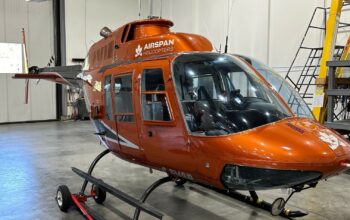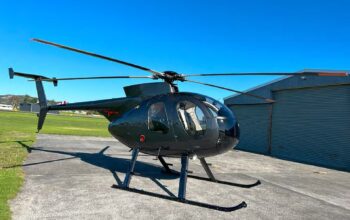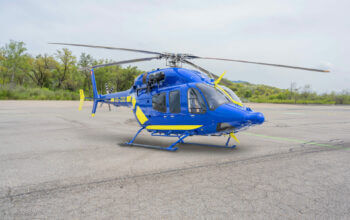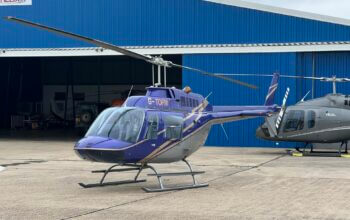Estimated reading time 7 minutes, 21 seconds.

A decision by the U.S. Federal Aviation Administration (FAA) to add three antidepressants to its list of conditionally-approved medications for pilots has sparked renewed discussion about mental health in aviation and regulators’ stance on medical fitness.
In April 2024, the FAA announced it has added duloxetine (also known as Cymbalta), venlafaxine (Effexor) and desvenlafaxine (Pristiq) to its list of conditionally-approved medications. All three are serotonin and norepinephrine reuptake inhibitors (SNRIs), used to treat anxiety and depression.
The National Business Aviation Association (NBAA), applauded the decision, calling it a reflection of the agency’s “consideration of industry input in gaining a greater understanding of pilot mental health concerns.”
These newly-added medications join four other antidepressants, known as serotonin reuptake inhibitors (SSRIs), which the FAA conditionally approved in 2010: fluoxetine (Prozac), citalopram (Celexa), escitalopram (Lexapro) and sertraline (Zoloft).
In 2023, the FAA added sustained-release or extended-release bupropion (Wellbutrin) to the list. These new conditional approvals are in line with “taskings and recommendations” made in a report issued by an FAA aviation rulemaking committee (ARC) for mental health and aviation medical clearances, said Mark Larsen, director of safety and flight operations for the NBAA.
“Consideration and conditional acceptance of SNRIs is a change the ARC asked for,” said Larsen. “It’s encouraging to see the FAA take this step to recognize more treatment methods that are known to be effective in addressing a number of mental health concerns.”
Pilots using these medications must petition the FAA for a special issuance medical certificate, “after demonstrating their treatment is not causing harmful side effects that could affect their aeromedical performance,” the NBAA said.
The conditional approval process may take more than a year to complete, during which the pilot will be grounded from flying, the NBAA said.
Still, “this is a positive step in the right direction,” said Larsen. “NBAA encourages the FAA to continue implementing the ARC’s recommendations to best address aviation mental health concerns.”
In Canada, medical fitness for pilots and air traffic controllers who use antidepressant medications is determined on a case-by-case basis. Transport Canada (TC) has said these medications, “may be acceptable for aviation activities in selected circumstances.”
Some have argued the regulator’s traditional approach of grounding pilots who use mood-altering medications prevents aviators from getting the treatment they need.
TC notes on its website that any Canadian pilot or air traffic controller using mood-altering medications will initially be refused certification or have their medical certification suspended, “until the circumstances of the case are reviewed.”
Medical advisors then determine if the individual situation represents a threat to flight safety. Both the underlying medical condition and the side effects of the medication are considered in the decision.
“Every case is considered individually and assessed according to diagnosis, severity of symptoms pretreatment, medication dosage and type, response to treatment, side effects of medications and prognosis for recovery or need for prolonged therapy,” said TC.
The regulator has said most side effects from these medications are of “little significance,” but noted a small number of pilots may experience serious changes in thinking, mood, judgement and personality.
“Of even greater concern is that often these effects may go unrecognized by the pilot or air traffic controller,” TC said.
The regulator estimates about six per cent of aircrew are living with depression, similar to the general population; however, pilots appear reluctant to disclose an illness to aviation medical authorities.
The number of pilots reporting an illness does not reflect the prevalence data, TC said. Some have argued the traditional practice of medical suspensions and limited options for return to flying duties, leads many aviators to self-medicate or forego treatment.
This, along with a host of other factors, prompted TC’s individualized approach, with no blanket authorization or acceptance for SSRI use.
“The evidence upon which to base a permanent solution has not been gathered fully in the aviation environment,” TC said.
“There is an increasing consensus of medical opinion that it is possible to allow the use of these medications in aircrew, in circumstances that would not compromise flight safety or operational effectiveness, and, on the positive side, would allow the preservation of trained aircrew resources.”
In the meantime, discussions continue. Earlier this year, the U.S. House Transportation Infrastructure Committee sent a bipartisan letter to the FAA, encouraging the agency to update its mental health protocols to ensure pilots have timely access to treatment.
“This issue is a priority for business aviation, and we know it’s a priority for FAA and National Transportation Safety Board (NTSB) because it’s vital to aviation safety,” said NBAA president and CEO Ed Bolen in a February statement.
“We will continue to work with the agencies, Congress and others to ensure those in our industry can get mental health care without concerns over whether doing so will impact their employment.”









I find this VERY disturbing because psych doctors (all doctors) aren’t taught how to taper patients safely off these psych drugs. Doctors are notorious for tapering/reducing by dose (too much too fast), or will have you skip or alternate days, will swap you from one drug to another without any tapers, will bridge you to a different drug, some will have you stop abruptly with no tapering at all, etc. These methods can come with severe disabling withdrawal symptoms that can weeks, months and even years.
I trusted and followed my doctors’ advice bridging from Effexor to Prozac over 2 weeks. When that didn’t work and she dismissed all my withdrawal symptoms (hallucinations, sweating profusely, jerking uncontrollably, severe nausea, etc.) she sent me a letter saying I was no longer a patient of hers. I was a normal full functioning adult until this happened and never in my life had any of these symptoms before.
I found a different doctor and he poly drugged me with 18 psych drugs (combo of 5-6 at a time) over the period of 4 mos. I ended up bedridden, barely able to walk or feed myself for 3+ years. He deemed me non-compliant because I couldn’t tolerate all the psych drugs he was prescribing me.
I found a 3rd doctor who said my condition had nothing to do with the psych drugs and blamed me adding lots of false diagnoses. It’s been 11 yrs. since this happened and my brain and body have healed a lot over the years. I was able to get off all these drugs tapering at a very slow rate and I’ve been psych drug free for over 2 yrs. I’m doing great other than some lingering symptoms from the damage doctors did to my central nervous system.
Last year (2023) an international recognized medical code was added for “Protracted antidepressant withdrawal syndrome 1285639002”. What I went through for years yet doctors denied it.
I have taken Effexor for 15 years and experience so many side effects, not least brain fog, poor memory and extreme fatigue, that I would have serious concerns about a pilot taking this medication – in my experience this is a very bad idea.